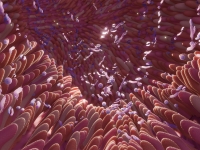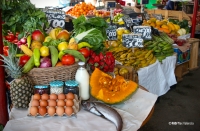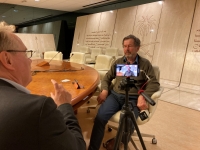News

10/05/2023
FAO began a project last month to pave the way towards improving the food control system in the Republic of Uganda. A 5-million-euro project funded by the European Union, "Strengthening of Capacities and Governance in Food and Phytosanitary Control,” is set to provide technical support and work with Competent Authorities and other leading institutions in 11 countries that are Members of the African Union to build up capabilities, strengthen governance and improve strategic planning around two main components: food safety and plant health. As part of the food safety component, an assessment of the national food control system will be...

10/05/2023
This week marked the 11th International Symposium on Shiga Toxin (Verocyotoxin)-Producing Escherichia coli (VTEC 2023) Infections, held in Banff, Alberta, Canada. This conference, which has convened regularly since 1986,

08/05/2023
The gut microbiome is highly dynamic and complex microbial community that resides and interacts within the gastrointestinal tract. This “community” can take part in various physiological activities, such as digestion and immune function, and helps maintain intestinal and systemic homeostasis. In addition, the gut microbiome is very sensitive to environmental factors, including diet, which can have both positive and negative impacts on health. Imbalances of the gut microbiome have been associated with various disorders, including obesity, diabetes and inflammatory bowel disease.
With the advent of omics technologies, the study of the gut microbiome has taken a holistic approach, allowing for a...

20/04/2023
Climate change, sustainable production, emerging threats to agricultural and food systems, antimicrobial resistance (AMR), among others, are food safety challenges. Would you like to know more about this? How can Codex standards help you and your country? How are Belize and El Salvador planning to address those challenges?
The webinar on the future challenges in food safety will be held on 28 April 2023, in English and Spanish, 10.00 – 12.00 (GMT-5). The speakers include representatives of FAO, Belize Agricultural Health Authority and the Codex Contact Point in El Salvador. This series of webinars...

19/04/2023
The meeting of the Codex Committee on Contaminants in Food (CCCF) this week in Utrecht provided an opportunity Tuesday for discussions on FAO’s foresight programme in a FAO -hosted side event.
Vittorio Fattori, FAO Food Safety Officer, and Daniela Battaglia, FAO Animal Production Officer, were joined by Ong How Chee from the Singapore Food Agency in presenting the challenges and opportunities posed by new and emerging foods and food production systems. The presentations were followed by a question-and-answer session with an audience made up of Codex Members and Observers.
“The global agrifood system is changing,” said Fattori, as he spoke of shifting...

18/04/2023
Gene (or genome) editing is a term to cover various molecular biological techniques used for introducing changes in the genome of living organisms. These techniques can be used for many purposes, including medicines, agriculture, and food production, to name a few.
The FAO issue paper “Gene editing and agrifood systems” published in 2022 stated that gene editing technologies represent a promising new tool for plant and animal breeding in low- and middle-income countries. In fact, gene editing can be used to develop diverse traits to increase food production and quality, as well as contributing towards sustainability and climate change resilience....

14/04/2023
Following the recent release of an FAO/WHO report on the food safety aspects of cell-based food, we spoke with one of the lead authors to find out more. Here is what FAO Food Safety Officer Masami Takeuchi shared.
Have you identified any new food safety risks or hazards?
First of all, the terms “risk” and “hazard” have completely different meanings, thus it is important to make a clear distinction. A hazard is a potential danger (e.g. substance), the risk is determined whether we humans are exposed to such hazards (i.e. likelihood). A common example is electricity in our houses. The voltages...

06/04/2023
After the latest ad hoc Joint FAO/WHO Expert Consultation on Risk Assessment of Food Allergens, we had a chance to have a quick chat with Simon Brooke-Taylor, who chaired the meeting. Brooke-Taylor, an expert in food allergens, provided some insights on this area of study and on what we can expect in the future when it comes to food allergies.
How has the science of food allergens been evolving?
We know a lot more about allergens, what causes them, how to detect them, maybe also how to protect people from them.
How did you become an expert in food allergens?
I'm a regulatory affairs...

05/04/2023
FAO, in collaboration with the World Health Organization (WHO), published its first global report on the food safety aspects of cell-based food today. The publication includes the results of an FAO-led expert consultation that was held in Singapore in November 2022, where a comprehensive food safety hazard identification was conducted. Hazard identification is the first step of the formal risk assessment process.
The publication was launched during a joint FAO/WHO webinar on 5 April 2023. It includes a literature synthesis of relevant terminology issues, principles of cell-based food production processes, the global landscape of regulatory frameworks and case studies from Israel,...

04/04/2023
FAO is pleased to announce its new roster of experts for the Joint FAO/WHO Expert Committee on Food Additives (JECFA) for the 2023-2027 period. A total of 133 international scientific experts from 34 different countries, representing all FAO regions, were selected in response to the call for experts issued in 2022. Approximately, 40 percent are female and 60 percent are male. The number of experts increased 58 percent compared to the previous roster.
Members of the roster will be considered for future activities of JECFA according to the expertise required and in accordance with the procedures described in the FAO/WHO framework for the provision of...
Stay up to date and connect to our RSS feed!
